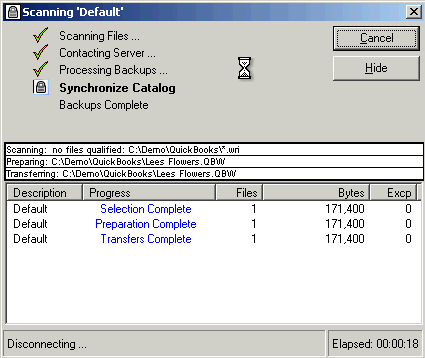How Does It Work?

BackUpPoint works basically like regular data backup software, with one important difference. Instead of sending backups to a tape drive or other media attached to the computer it is backing up, BackUpPoint sends the backup over the Internet, regular telephone lines or network connections to another computer safely offsite. It does this (usually) at night while your computers aren't being used.
It’s completely automatic. In fact, you may even forget it’s working. Most businesses put their lives on the line every night and don’t realize it. With businesses depending more and more on the data stored in their computers, proper backups are becoming much more critical.
BackUpPoint accomplishes several essential steps that are often overlooked or done improperly by other backup software - especially in the regular non-automated backup systems.
Backups are done on schedule, reliably. Most businesses don’t do this. For one reason or another, they don’t keep a regular backup regimen. Usually it’s because the person responsible for doing backups (if there is one) is too busy doing something else, or someone is using the computer when it’s time for a backup, or they simply forget. Since BackUpPoints are done with automated software usually at night, when nobody is using the computer, backups are always done on schedule.
The correct files are backed up. Ordinary backup software is often installed with a list of files to be backed up. This set of files usually represents the state of the system when the software was installed, and often misses critical files. Further, it often fails to back up files that get added later. Compounding this problem, VERY few businesses take the trouble to reset their backup software regularly to include new files.
BackUpPoint solves this problem by constantly reevaluating your computer system, adding files to the backup as needed. Multiple copies of files are stored using a sophisticated version control system unavailable in most other backup software of any kind. This is much too important to overlook.
The general definition of “proper” backups requires redundancy. One must keep multiple copies of the same files at different points in their development, called versions. As an example, you should have a different copy of each backed-up file for each backup session. Further, you should be able to easily restore any of your files up to any given point in time. Banks do it, big corporations do it, and so should small businesses. Only BackUpPoint has such an easy to use version control system.
BackUpPoint encrypts its backups for complete security so nobody, not even your RBS Service Provider can read your files. Backups are immediately sent offsite and stored safely away from your computer and your business. This is where almost every business makes its biggest mistake. Even if you do everything else perfectly, your backups are of little use if your building burns, or you are unable to physically recover your tapes from the premises. Most small companies who do backups leave the tapes in the building with the computer, where they can be destroyed right along with the computer.